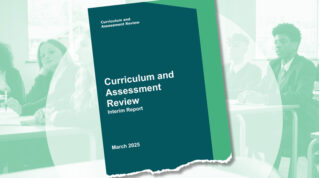The new government’s curriculum and assessment review will launch a call for evidence in September, with national roadshows to ensure those “on the frontline” can have their say.
As revealed by Schools Week yesterday, Professor Becky Francis will lead the review, starting as chair next month.
She will be supported by an expert panel, with a call for evidence launching in September. Results will be published in 2025.
However, with the government’s current workload commitments – this could mean any changes may not be introduced until as late as September 2026, more than two years away.
Here’s your trusty Schools Week round up of everything you need to know …
1. Expert panel, and sector views ‘vital’
As Schools Week revealed yesterday, Education Endowment Foundation chief executive Francis will lead the review as its chair. She will start on August 6.
Francis will also be supported by an expert group “made up of individuals with experience right throughout the education system”. They have yet to be appointed.
A government press release also said the views of experts, parents, teachers and leaders “will be pivotal to the recommendations”.
2. September launch and curriculum roadshows!
An official call for evidence will be launched in September. The review will also take written evidence from “key stakeholders”.
Plus – there will be a “national roadshow” to meet and get input from staff “on the frontline”
3. Findings next year, but could be 2026 before changes
The government would only say the review will publish an interim report in “early 2025”. Full fundings will be published in Autumn of next year. The Department for Education has not said when changes would be implemented.
But its own workload commitment is that any major curriculum changes should be brought in, where possible, at the start of a school year – with a “lead in time of at least a year”.
If this was adhered to, it means any eventual changes might not be introduced until September 2026 – more than two years away.
4. ‘Broad, inclusive and innovate’ curriculum sought
The review aims to “address the key problems and hard barriers to achievement”, and will look at key stage 5 first before going all the way to key stage 1.
In a terms of reference document published Friday, government said the review will “seek to refresh the curriculum to ensure it is cutting edge, fit for purpose and meeting the needs of children and young people to support their future life and work.
“The review will ensure that the curriculum appropriately balances ambition, excellence,
relevance, flexibility and inclusivity for all our children and young people, and it will ensure
meaningful, rigorous and high-value pathways for all at 16-19.”
It will “build on the hard work of teachers who have brought their subjects alive with knowledge-rich teaching, to deliver a new national curriculum which is rich and broad, inclusive and innovative”.
The review will also look “closely at the key challenges” to youngsters’ attainment and the barriers that hold children back, in particular those who are socio-economically disadvantaged and those with special educational needs.
Views will also be sought on whether the current assessment system “can be improved for both young people and staff, while protecting the important role of examinations”.
5. The review’s five aims are …
- An excellent foundation in core subjects of reading, writing and maths
- A broader curriculum, so that youngsters do not miss out on subjects such as music, art, sport and drama, as well as vocational subjects
- A curriculum that ensures children and young people leave compulsory education ready for life and ready for work. This includes embedding digital, oracy and life skills in the curriculum
- A curriculum that reflects the issues and diversities of our society, ensuring all children and young people are represented
- An assessment system that captures the strengths of every child and young person and the breadth of curriculum, with the right balance of assessment methods whilst maintaining the important role of examinations
6. Recommendations could cover accountability measures, too
The terms of reference set out which areas the review should delve into. It will:
- Review the curriculum and “mechanisms for assessment” at every key stage, looking at “what is and is not working well”
- Pay “particular attention to the ceilings to achievement which exist in curriculum and assessment at Key Stages 4 and 5
- Seek evidence on the condition of the curriculum and assessment at key stages 1 to 3, and be “clear on expectations for every child’s achievement by the end of primary school”
- “Appraise present assessment stages and mechanisms, including reviewing existing performance measures and the behaviours and outcomes they incentivise”
- Undertake “initial scoping” for “any amendments or alternatives to existing performance measures and curriculum frameworks or qualifications”
- “Offer commentary on the impact of accountability on the curriculum and assessment system”, with recommendations on how proposed changes “should interact with accountability measures”
- Not make recommendations “directly in relation to core schools funding or workforce supply issues. These will be considered in the round by the Government at the next Spending Review”
7. But ‘evolution not revolution’ (and workload pledge)
However despite those commitments, the government said the review will “seek evolution not revolution”. They recognise the “pressure schools and colleges are already under, and the further strain the wholesale reform can bring”.
Government has pledged to be “alive to the trade-offs required to deliver high and rising standards alongside greater breadth – in particular any recommendations that would increase workload”.
Francis said: “I know how stretched schools, colleges and their staff are. So it’s particularly important to me to consider how any changes could contribute to staff workload and to avoid unintended consequences.
“Crucially, I want to make sure that the review and its recommendations are driven by evidence and a commitment to high standards for all our young people, irrespective of background.”
But one big change, already announced, is that academies will now have to follow the national curriculum up to age 16.
8. Review will ‘breathe new life into outdated curriculum’
Education secretary Bridget Phillipson said this is an “important step in this government’s mission to break down barriers to opportunity, deliver better life chances and enable more young people to get on”.
The review will “breathe new life into our outdated curriculum and assessment system” which has “for too long … held back” children.
9. Ex-DfE adviser and tutoring boss to lead EEF
Francis will join the DfE on secondment to lead the review. The EEF’s directors of impact and research, Chris Paterson and Emily Yeomans respectively, will be interim joint CEOs in her absence.
Paterson was formerly a policy adviser at the DfE, while Yeomans was a director of the National Tutoring Programme.
Dame Christine Gilbert, EEF chair, will “provide additional time and extra support” as “executive chair”.
Gilbert added: “A common thread running throughout Becky’s career has been a laser-like focus on addressing educational inequalities. I have no doubt that she will bring this commitment to the review.”
















Your thoughts